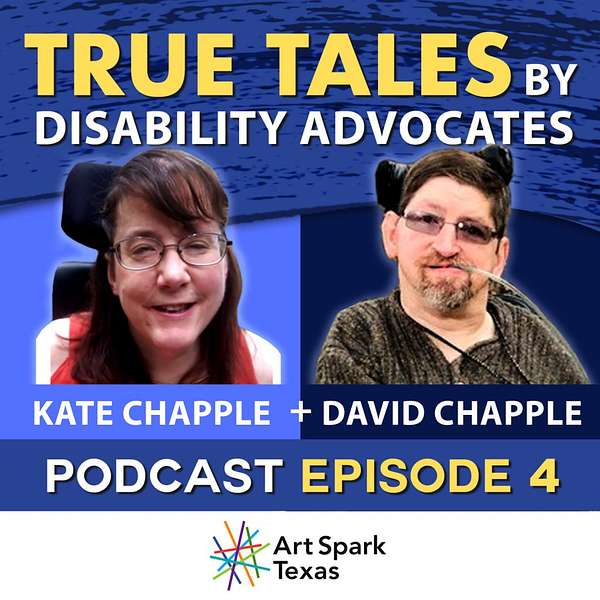
True Tales by Disability Advocates
Where advocates harness the power of storytelling to build community with their peers and hope to develop empathy in others. A team of disability advocates creates this True Tales podcast to share personal stories by disabled storytellers and add their voices to the growing community of podcast listeners.
True Tales by Disability Advocates
Love Has No Limits
Persons with disabilities often face the challenge of others’ misconceptions of their viewpoint and day-to-day life. In this episode, host Jennifer Howell visits with married couple Dave and Kate Chapple about their experience with such situations and the joyful message that love has no limits. In their stories, “My Journey with Religion” and "My Life in a Nursing Home,” Kate discusses her thoughts about fellow church members who prayed for her healing, and Dave shares what it’s like to be one of the youngest – by decades – residents at a nursing home.
Click here to listen with transcript
Dave Chapple
I am David Chapple and I am an employee at Imagine Art doing Peer Support for their Training 4 Transformation (T4T) program. T4T’s objective is to equip individuals who have a passion for supporting peers with disabilities to help them to transform and to become empowered so you can receive services that are person-centered. Also, I serve as Vice President on the board of Accessible Housing Austin an organization that is committed to providing affordable, accessible, integrated housing for low-income people with disabilities.
As Co-Project Leader of the AAC Training and Dissemination at RERC on Augmentative and Alternative Communication, I research how individuals who rely on AAC can be more independent. I write a blog named Speaking with Professionals Alternatively where I write about how people who rely on AAC interact with people from various professions. In my spare time, I like to travel with my wife and enjoy painting.
Social Media: https://www.facebook.com/dgchapple/
https://speakingwithprofessionalsalternatively.wordpress.com/
Kate Chapple
After high school graduation and with guidance from an independent living program, Kate Chapple moved from Houston to San Antonio, lived in a wheelchair-accessible apartment, and earned a BA in Special Education from UTSA.
Kate’s advocacy skills are highly recognized, and her 20-year career includes working with people with disabilities and assistive technology, as well as with or for public school systems, non-profits, and waiver programs.
Currently, a member of the hosting team’s Training 4 Transformation program for Imagine Art, Kate provides peer support to individuals with developmental and intellectual disabilities.
“Throughout my life, I have learned the importance of being my own self-advocate. No one knows what I need or want better than myself. The same goes for each person in the group,” she said.
Kate and Dave live in Austin with their four dogs and enjoy going to concerts, swimming, playing with their fur babies, and traveling.
Host Jennifer Howell
Jennifer Howell has a lifetime of personal experience with disability – as a caregiver, a teacher, and a person with disabilities herself. Those experiences now ignite her passion and inform her work as an Accessibility and Creative Placemaking consultant.
She is also a special education teacher, published author, and award-winning artist who works as an online instructor to learners around the globe, ages 4 to 94. She is an Accessible Yoga Ambassador who has been leading classes for seniors and persons with disabilities for over a decade. Other curricula she’s created include hand-lettering, cursive handwriting, and sustainable fashion. Jennifer is a member of IAMPETH (International Assoc. of Master Penmen, Engrossers, & Teachers of Handwriting) and the Climate Reality Leadership Corps.
Jennifer can be reached at
For more details about our programs go to Art Spark Texas, True Tales Podcast Page.
Welcome to to True Tales by Disability Advocates, authentic voices of people thriving with disabilities. Where individuals use the art of storytelling to change the world. The True Tales by Disability Advocates podcast is produced by Art Spark, Texas Speaking Advocates Program. Keep listening to hear how life's challenges can spark a desire to speak out and advocate for themselves and others.
MsBoye:Welcome to True Tales by Disability Advocates podcast, the"Love Has No Limits" bonus episode, in honor of Valentine's day. A team of disability advocates creates The True Tales to give voice to the personal stories and lived experiences of disabled storytellers. We offer our unique and often underrepresented perspective to the growing community of podcasters, worldwide. Love and romantic relationships can bring us the greatest joy in our lives, but at the same time, they can bring our most difficult challenges. I once heard someone say relationships, put miracle, grow on our issues(laughs). For folks with disabilities, there can be added layers of complications. In this episode, we bring you a love story and ask you to consider how a spiritual practice of mindfulness and love with no limits, might change how you interact with people with disabilities you encounter. Host Jennifer Howell introduces married couple Dave and Kate Chapple. They are our first guests for whom speech is not their primary way to express themselves. They communicate using Argumentive and Alternative Communication devices, ACC devices, such as text to speak technology and voice synthesizers. Because of the limitations of communication device technology, Kate and Dave chose to prepare their answers in advance. Even so there are often long silences in the conversation, and this is especially true when using eye-tracking to navigate the equipment. In our recording sessions, we allowed time for them to respond at their natural pace, but we chose to edit these silences in the final recording to fit the flow of the podcast format. However, you may notice more silence than usual. We did this to honor the essence of this form of communication. We have also left in the beeps that sprinkle these conversations as the equipment moves along. Wherever possible. I have also indicated them with a(beep) in the transcript. For the final question in Kate's interview, she wanted to add to her planned response, but is concerned that her listeners who are not familiar with her vocal style may not be able to understand her. So she asks episode producer, Kristen Gooch to interpret. Kristen is familiar with supporting Kate in this way because they've worked closely for the last year on a team project. You'll hear Kate's voice for the beginning of the response and Kristen's voice for the details lost in the recording process. In her story,"My Journey With Religion", Kate picks up on the themes of episode three,"Community, Faith and Inclusion." and tells us her early experiences in church communities. She points out that well-meaning folk with good intentions, still need to be mindful of ableism, underlying their message and in the language they choose. In the second half of the show, Dave reveals the lengths he was willing to go to be with Kate, the love of his life. His story"My Life in a Nursing Home" shows how he used humor to get through an inconvenient, complex situation. But the story also leaves the listener outraged at the absurdity of a system that often controls the life of folks with disabilities. True Tales by Disability Advocates, harnesses, the power of storytelling to build community with peers and hopes to develop empathy and others. Whether you are listening to this episode on Valentine's day or a week, or at another time of the year, ask yourself if you have the courage to live and learn in all areas of your life as if love has no limits.
Jennifer Howell:Our first guests, Kate Chapple is here to share her story,"My Journey with Religion". Welcome Kate. Before you begin, would you tell our listeners what led you to The Speaking Advocates Program?
Kate Chapple:I used to be a part of Actual Lives with Art Spark.(beep) It was formerly known as V. S. Arts.(beep) Then one day I got hooked up with The Speaking Advocates I decided to join.(beep) I really enjoyed Actual Lives, so I thought it would be fun to be in The Speaking Advocates(beep) and it was.
Jennifer Howell:Oh, thank you so much Kate. We are looking forward to hearing your story. Please share with us.
Kate Chapple:I was born into a Baptist family, the youngest of three daughters.(beep) My first memory that involved worship was at a camp. I attended for children with disabilities at around six years of age.(beep) Camp was two weeks long and on Sundays they had a religious service. beep) I didn't think much of it, beep) I just loved watching the sign language interpreters. beep) The idea of a guardian Jesus was a concept I could not comprehend at that age. And unfortunately I wouldn't comprehend this or believe in God for a long time. beep) Sure, my grandmother on my dad's side of the family taught me the words to"Yes Jesus Loves Me", but it was just a song, just like some songs I like on the radio today. I didn't really know what the lyrics are saying, but I still loved the melody.(beep) My family attended church every Sunday. I dreaded the thought of going. beep) My mom getting me all dressed up and oh, the torture of her curling my hair with the curling iron. beep) Ninety-nine percent of the time, God could not save her from burning my ears or forehead. Because of this, I began to equate church Sundays with torture. Then once I suffered through the dreaded curling iron, I had to face the looks and pat on the head with the"poor little handicap girl in the wheelchair" phrase,(beep) I developed this hatred against religion. beep) If these people claim to be loving Christians followers of our Heavenly Father, why were they treating me like I was some kind of freak? beep) This was the attitude I had most of my younger years, but God that shine through a few times. beep) Somewhere in my middle school, years of attending Sunday school, there was a boy in my class who befriended me. beep) I am not sure why he was so accepting of me, but he had a great Godly spirit.(beep) I could not wait to go to Sunday school to spend time with him.(beep beep) To me spending time with the one person at church who saw me for more than my disability brought me closer to God. Unfortunately, my only church friend moved away and I stopped going to Sunday school.(beep) It was around that dark time when my parents separated, which lead to their divorce. beep) During my teenage years, I decided to sleep in until 12:30 on Sundays and forget church. beep) My dad would get me up to the smell of Popeye's chicken and biscuits.(beep) That was my religion and it worked for me.(beep) I was trying to fit in and make friends. beep) I finally had success with making real friendships that would last for a life time.(beep) Unfortunately, most of my friends were anti religious and we spent a lot of weekends together. So for many years, church and God were not a priority in my life. In my thirties, after many years away from God, I hired an attendant who attended Gateway Church and read the Bible daily. beep) We would have many long debates about Jesus.(beep) We debated if the Bible really was the word of God, it was written so long ago and translated a thousand times.(beep) How was I supposed to believe this old book, about a guy who would perform miracles(beep) so he could make me walk and take my disability away?(beep) But what if I didn't want to be healed?(beep) Think about it, beep) I will be disabled one minute and perfectly normal the next, beep) but my normal, my normal was me. beep) I would be so freaked out in my new normal that I wouldn't even know what to do with myself. I had a million questions and I finally agreed to go visit Gateway for answers. beep) Also around this time, another wonderful Gateway member became my attendant(beep) after she worked for me a couple of months, she invited me to her small group. beep) She would take me to her small group every week, even though she wasn't even getting paid for taking me.(beep) I think it was her goal to show me who God was and how he loved me. beep) She was successful. beep) We started going to Gateway most Sundays, but this time there was no curling iron. beep) Over time I grew more and more to trust in God and realized he had been with me all my life. I was just blindsided by distractions and God couldn't even find access into my heart.(beep) One day in March my boss informed me that my wonderful job with this school district, working with students who use communication devices would be coming to an end at the end of the school year. beep) I remember that day, like it was yesterday. beep) My boss told me I could have the rest of the day off.(beep) suddenly I looked at him and said, that would be silly. I had students to help that day.(beep) I knew at that hard moment that God was with me and would open other doors for me to help children like me.(beep) It was at this moment that I truly saw where God would lead me.(beep) He would lead me wherever he wanted me to go, as long as a curling iron was nowhere in sight. beep)
Jennifer Howell:Welcome back. I'm here again with Kate. Kate Thank you, we are so grateful to you for sharing your story. You said that you received looks and pats on the head from people at your church, who said, Poor little handicapped girl," when they saw you. And you mentioned that they treated you like you were some kind of freak. What else did they do that made you feel uncomfortable or hurt? I know that there are many well-meaning people who are listening today who are unaware that their actions and their words may be hurtful. So perhaps when they know better, they will do better. So please enlighten us.
Kate Chapple:From what I can remember since it was over 30 years ago, I thought to myself, I could understand why people excluded me at school after school activities. Or in other settings.(beep) However, my family always told me people who went to church were loving, caring, and accepting of one another because they were all children of God.(beep) My experiences of church were quite the opposite, especially when I went to Sunday school.(beep) I remember feeling extremely isolated and my peers almost never interacted with me or included me in group discussions.(beep) At least when I went to school and to the general education classrooms, I had an assistant teacher who accompanied me and they helped to facilitate my classmates interactions with me.(beep) Plus, unlike my general education teachers, my Sunday school teachers had no clue on how to include someone with a disability in their lessons.(beep) So in an ideal situation, I believe Sunday school teachers could be equipped with the knowledge on how to include children who have disabilities into their lessons.(beep) More importantly, be informed about the individual's accommodation needs for them to participate in lessons.(beep) Maybe the children in the class could learn them as well.(beep) I feel this could have been very helpful in my circumstance.
Jennifer Howell:Yes, thank you, and about the boy, the boy who befriended you, when you were about middle-school age at church. You said that he made you feel accepted and I'm wondering, what was it that he did that made you certain that he saw you for more than your disability?(beep)
Kate Chapple:Honestly, I don't remember how he went about befriending me.(beep) My guess is he might have had a family member who had a disability because he was very comfortable hanging out with me outside of Sunday school. I remember that I went to my first lock-in at our church because he could help me with most of the things that I require physical assistance with.(beep) A lock-in is when your parents dropped you out about six o'clock at night, and then they didn't pick you until late the next morning.(beep) The church staff took the kids to Chucky Cheese Pizza at one-o'clock in the morning.(beep) It was only for the kids from our church, who were there.(beep) I remember having the time of my life that night for once in my life, I felt the spirit of God in someone who was a church goer.(beep) It gave me hope that God is in the picture, and church goers really did live the walk of Jesus.(beep) However, after he left things went back to the same way for me, being isolated and not included in church events.(beep) I eventually stopped attending Sunday school, as it was more harmful than helpful to my spiritual needs.
Jennifer Howell:Oh yes. Yes. I can see that. Well, you mentioned when you were older in your thirties, that you had many discussions and debates, I guess, with your attendant. One of the topics was that God could take your disability away, that you would no longer need a wheelchair, but you asked maybe God didn't want you to be healed? There are many well-meaning Christians who have made others feel inferior because of their disability or maybe less than, or like there was something wrong with them. What does it feel like to be the recipient of pity or the, the subject of prayers for you?
Kate Chapple:(beep) When people tell me they will pray for me, I think to myself, what are they going to pray for? I am pretty well off, yeah, you know I am not sick with any kind of illness that I need to recover from. I have Cerebral Palsy, I really do not know a life without it. From my perspective, the whole notation of being healed just by touching Jesus, would be very unsettling to me.(beep) I say this, I mean, to be disabled for all of my life and suddenly became able to walk would be a shock to my whole sense of being.(beep) I would have to have serious counseling to cope my new life. I know people mean well by praying for me, however, I feel it is kind of a cop-out because it easier for people to pray rather than get to know how they could support me.
Jennifer Howell:Oh, that was so good, very helpful I think. I mean, that's what this is, this is what this is all about you know, people, people said things to my mom and said things to me that, they probably had no idea that they were hurting our feelings or making us angry, they didn't know and so I don't want to be guilty of that too. Well, Kate, what you have revealed today about your experience has educated us and for that, we're very grateful. Your story was so good at making us think about our words and actions towards persons with disabilities, even when we go to church. Well, now I know, and I want to do better right now,. Will you please share with our listeners what you are working on and how they may follow you?
Kate Chapple:I am working with Imagine Art,T for T yeah, but I don't know if people will understand what I say.
Kristen Gooch:Kate yeah, I didn't want to jump in, in the middle of the interview. Do you want support with saying what you just said?
Kate Chapple:Yeah.
Kristen Gooch:Okay. Kate is working for Training for Transformation at Imagine Art. She is the point person for Channels for Self Advocacy. She also has a blog.
Jennifer Howell:Thanks again, Kate,
Kate Chapple:Thank you so much for having me..
Jennifer Howell:Okay. Stay with us for our second story, when Dave Chapple shares his own tale of when he needed to spend time in a nursing home. I'm inspired by the courageous choices, he was very courageous, he had this really difficult decision to make and he did what he had to do. Welcome back to the podcast changing the world one story at a time. We just heard from Kate Chapple and now we will meet her husband Dave. Welcome Dave, before you share your story with us, would you please tell our listeners what was it that led you to The Speaking Advocates Program?
Dave Chapple:Way back in 2013, I learned about a new writing program that VSA(beep) now Art Spark where the participants, had the opportunity to become self advocates by writing personal stories.(beep) This program eventually became Opening Minds, Opening Doors, and eventually became The Speaking Advocates.
Jennifer Howell:Thank you so much. We cannot wait to hear your story.
Dave Chapple:Have you ever done something in your life that you didn't want to do, but you knew it was for the best? Or have you ever been confused about whether go with your heart or listen to so-called professionals? beep) Don't those situations just suck?(beep)(beep) The story I am about to share is about one of those situations that I had to live through, but the outcome was worth it.(beep) I moved to Austin from Cleveland in April of 2012, to be with my fiancée Kate.(beep) My best friend, Mike drove me and my two dogs in a big moving truck across the country, with my van being towed behind.(beep) Mike said it was like driving a tank with a white elephant pulling us from behind? beep) When I left Ohio, I lost my Medicaid benefits and I was told by someone here the fastest way to get(beep) Medicaid was to go into a nursing home.(beep) I put off going into the nursing home for about seven months because people, Kate included said there were other ways for me to get Medicaid.(beep) This was so very frustrating because I was being pulled in all kinds of different directions and I didn't know whose advice I should take. I had to ask myself, should I be listening to the love of my life, Kate, whose advice was getting me nowhere fast? Or should I listen to professionals who were pushing me to do something? I absolutely dreaded and frankly, something very scary for me. I struggled with this and there were times I was ready to be admitted, but literally at the last minute it was postponed either because a piece of paperwork was missing or due to my not wanting to be in a nursing home during the holidays. I was ready to be admitted the beginning of November, 2012, thinking I would be out in plenty of time to go on a Christmas vacation that Kate's family had planned, but I would find out that wouldn't be the case and I decided to wait until after the holidays. This was becoming a sore topic with everybody because my life started to be at a standstill and nothing was moving forward. Finally, on January 3rd, 2013, I admitted myself into a nursing home. The other residents were almost all 60 years old, or older. I was afraid to breathe too hard on them because most looks so frail a light breeze would knock them to the ground. But there were two guys close to my age and we became friends. One of them was named Sheldon and when we first met, he was wearing a big cowboy hat and he kept asking, Kate and me for a race down the hall in his bright, new shiny wheelchair. The other guy was named Ricky and he was shy and quiet at first. But when I got to know him, I quickly found out he was a cool and interesting guy. Ricky is a huge Dallas cowboy fan and his room was covered with Cowboys posters. The staff was mostly good to me. I think that was because I had a mind and I could not only tell them my needs, but I could tell their superiors that they were doing something wrong. I had my two favorite aides they really cared about the residents and they made sure I received the care I deserved. One was a large African American guy and he had the kindest heart and he would do anything for me. One of my friends nicknamed him the green mile, because he reminded her of the John Coffey character from the movie. The second aide became like a little brother to Kate and me, because every time he saw us, he gave us a big hug and he always took the time to talk it and make sure everything was going good.(beep) When Kate didn't have her attendant, when she was visiting me, they both helped Kate with dinner and they helped us to sit on the couch in the living room so we could have time alone together. although these two aides were great, there were some bad apples that were not caring, and I did get some people in trouble.(beep) If beep If somebody is unfamiliar with me and they don't know how I eat. It is very difficult to feed me because sometimes I have trouble controlling my mouth. When people don't know better, they think I am playing around with them. On this particular day, the staff was shorthanded and I had to wait until an aide was available to come and help me. Of course, the first available aide never fed me before and she had no idea how my mouth worked. People need to be patient and wait for me to open my mouth and rushing me only makes me more nervous and more spastic. Well, I could see this woman who was going to help me was already stressed because she was talking to herself in tongues I haven't heard in my entire life, and she was hopping around the dining room, like a Jack rabbit on drugs. When I didn't open my mouth, she started pushing spoonfuls of food in my face and the food got everywhere. I got pissed off and started kicking my feet because I couldn't use my communication device with food being stuffed in my face. When, I did that she threw the spoon down and left me. Many of the staff witnessed the aide's actions and she was reported. As a result, she was suspended and told not to have anything to do with me for the rest of my stay. Although I knew I would eventually get out of the nursing home and except for a few incidents I wasn't being mistreated, it was still frustrating to be in there not knowing how long I had to stay. Because again, people were telling me different things about how long it would take me to get on Medicaid and get the services I needed. First, I was told it would just take 30 days. I thought to myself, okay. A month. Isn't so bad. Although I was informed the day before I was going to be admitted that my Medicaid application wouldn't be considered until I was in the nursing home for 30 days straight. Then it could take another 30 to 60 days after that to be approved for Medicaid and my services to start. I was like, what the hell? However a bright spot was after the first 30 days, I was able to spend some weekends at home with Kate. I am glad to say there is a happy ending to this long and painful story. On April 19th, 2013, I permanently went home from the nursing home after 107 days with my full Medicaid benefits. Then forty three days after that Kate and I had our commitment ceremony when we became partners for life.
Jennifer Howell:Thank you, Dave. Thank you so much. We really appreciate that you are willing to share your story with our listeners. It's so unfortunate and disappointing that even today, so many still find themselves forced to enter a nursing home in order to qualify for Medicaid benefits. It happened decades ago, it happened to you in 2013 and to this day, it is still happening. Fortunately though there has been at the same time, an increase in types of services that are available, such as a day-hab care, group homes, other home health care options. Dave, what types of improvements do you still hope to see?
Dave Chapple:I really hope they either eliminate or at least raise the income limits for Medicaid. beep) Yes. I do require quite a bit of attendant care, which I am reliant on Medicaid to provide.(beep) However, I don't think it should prevent me from working and making a nice living.
Jennifer Howell:Yes. Yes. I think we all agree. Now, when you entered the nursing home, you talked about you were the youngest or one of the youngest in the nursing home. How did that make you feel to be one of the youngest in your community? And, what can you tell us about the stigma and the awkwardness that might be, experienced by persons with disabilities who participate in programs that are designed for and marketed to seniors to two persons over the age of 60 or 65?
Dave Chapple:I was fortunate that there were two other residents close to my age, so we used to hang out together. beep) Plus the staff enjoy talking to me because I was closer to their age than the other residents and gave them some entertainment and somebody to vent on when they were stressed. beep) As for programs being designed for older people, actually I never really thought about it because I have been receiving services since I was 18, so it is just something that helps me to live my life.
Jennifer Howell:Okay, thank you so much Dave. Thank you for giving us a look into your experience. Your courageous story has not only inspired us, but maybe perhaps it's initiated important conversations about how the health system and our country needs to be improved. I hope so. Will you please tell us what you are working on these days.
Dave Chapple:Well, I have a couple of jobs that keep me pretty busy.(beep) First I worked for the rehabilitation program at Pennsylvania State University, where currently we are working on improving communication between individuals who use communication devices and their medical providers. beep) Then I do Peer Support with the Training for Transformation Program, through Imagine Art. beep) I am a part of a team that runs peer support groups over zoom.
Jennifer Howell:Oh, that sounds like wonderful work. Thank you so much for all you do. And again, we appreciate you so much for being a guest on our program. Beautiful job, Dave. Thank you.
Dave Chapple:beep) Thank you very much for inviting me.
MsBoye:You've been listening to episode four of The True Tales by Disability Advocates."Love Has No Limits" our bonus episode in honor of Valentine's day.
Jennifer Howell:Thanks for listening. This show was produced by Kristen Gooch. It is edited and mixed by John Beer and Ms. Boye. Our script and production team includes Joey Gidseg and Toby Al-Trabulsi. Special, thanks to Kate Chapple and Dave Chapple for appearing. I'm this week's host Jennifer Howell and you've been listening to the podcast, changing the world one story at a time. Don't forget to follow us on Twitter and Instagram.
John Beer:All episodes of the True Tales by Disability Advocates are free on Apple podcasts, Spotify, and anywhere you get your podcasts. The program is funded in part by a grant from the Texas state independent living council, the administration for community living and individuals like you to learn about The Speaking Advocates Program. Sign up for our newsletter at Art Spark, Tx.org. That's A R T S P A R K T X dot O R G. The free virtual training is open to people of all disabilities, no matter where you live.
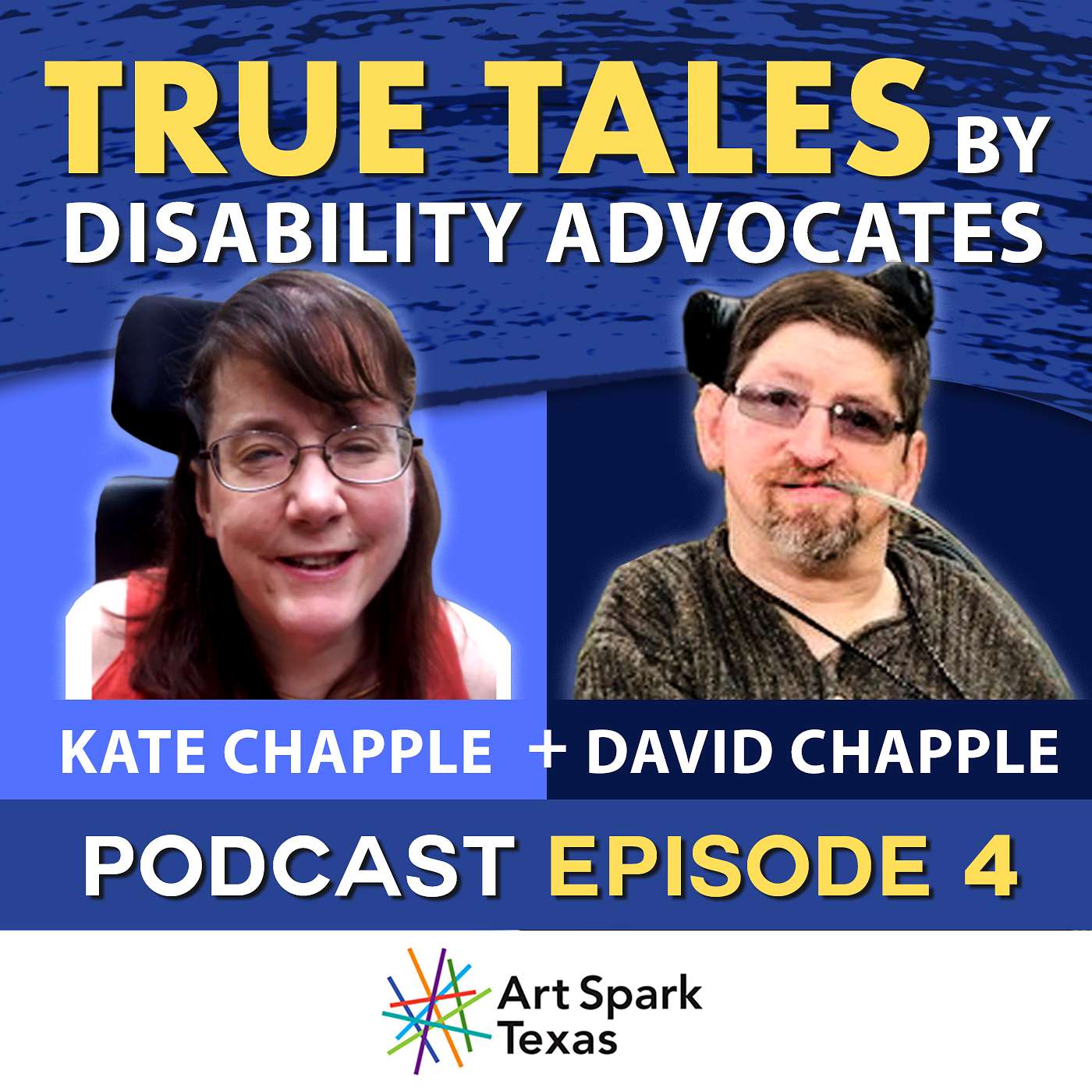
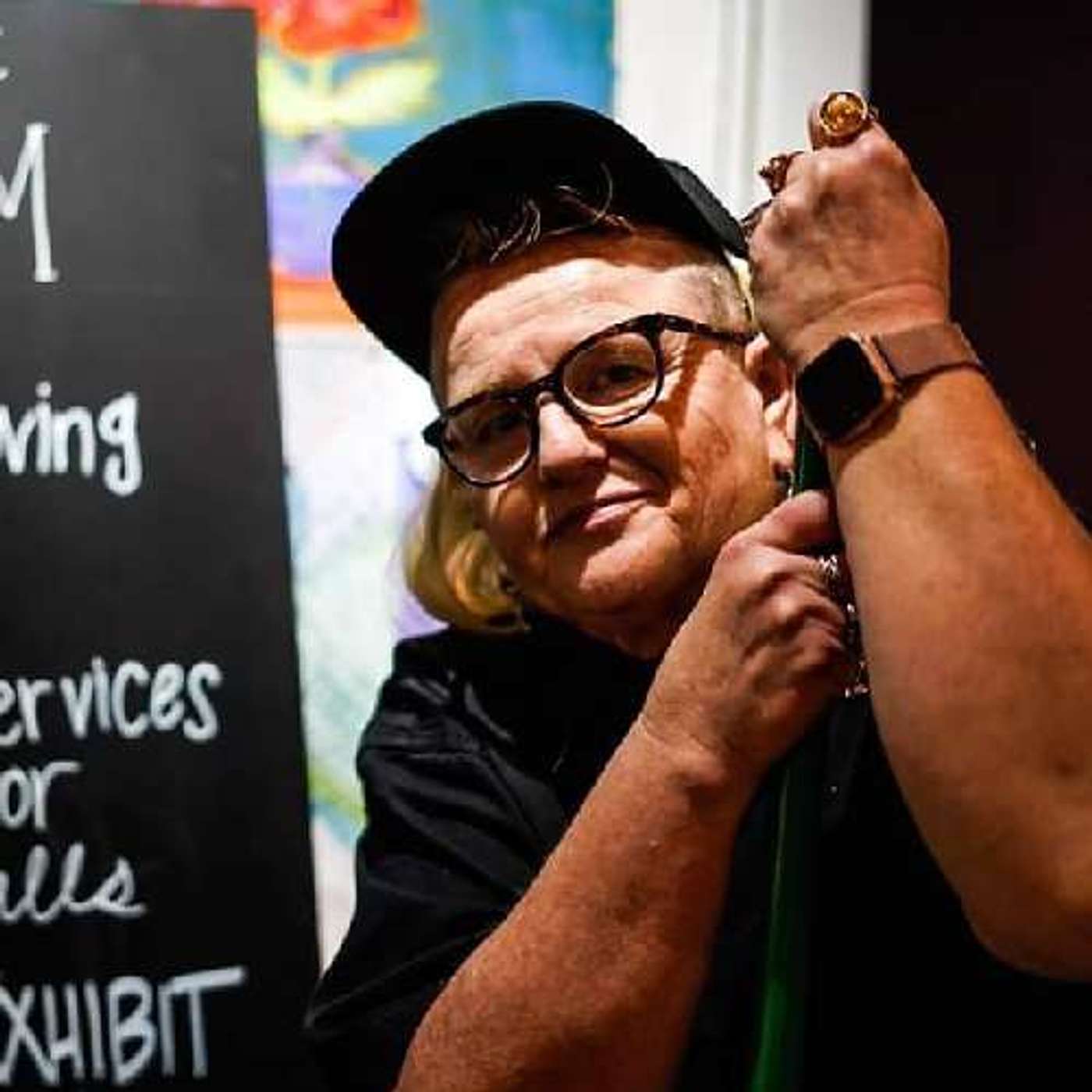
.jpg)
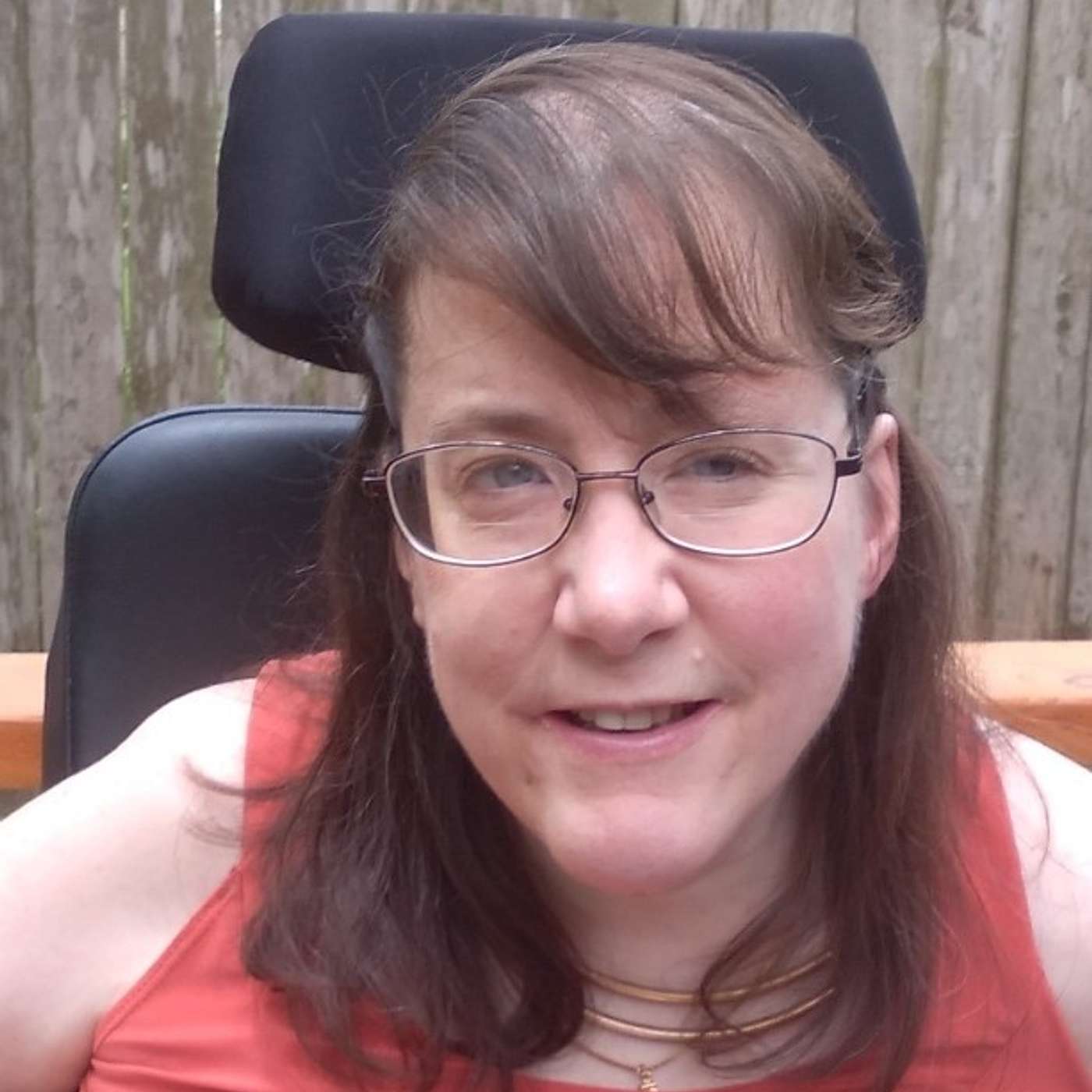
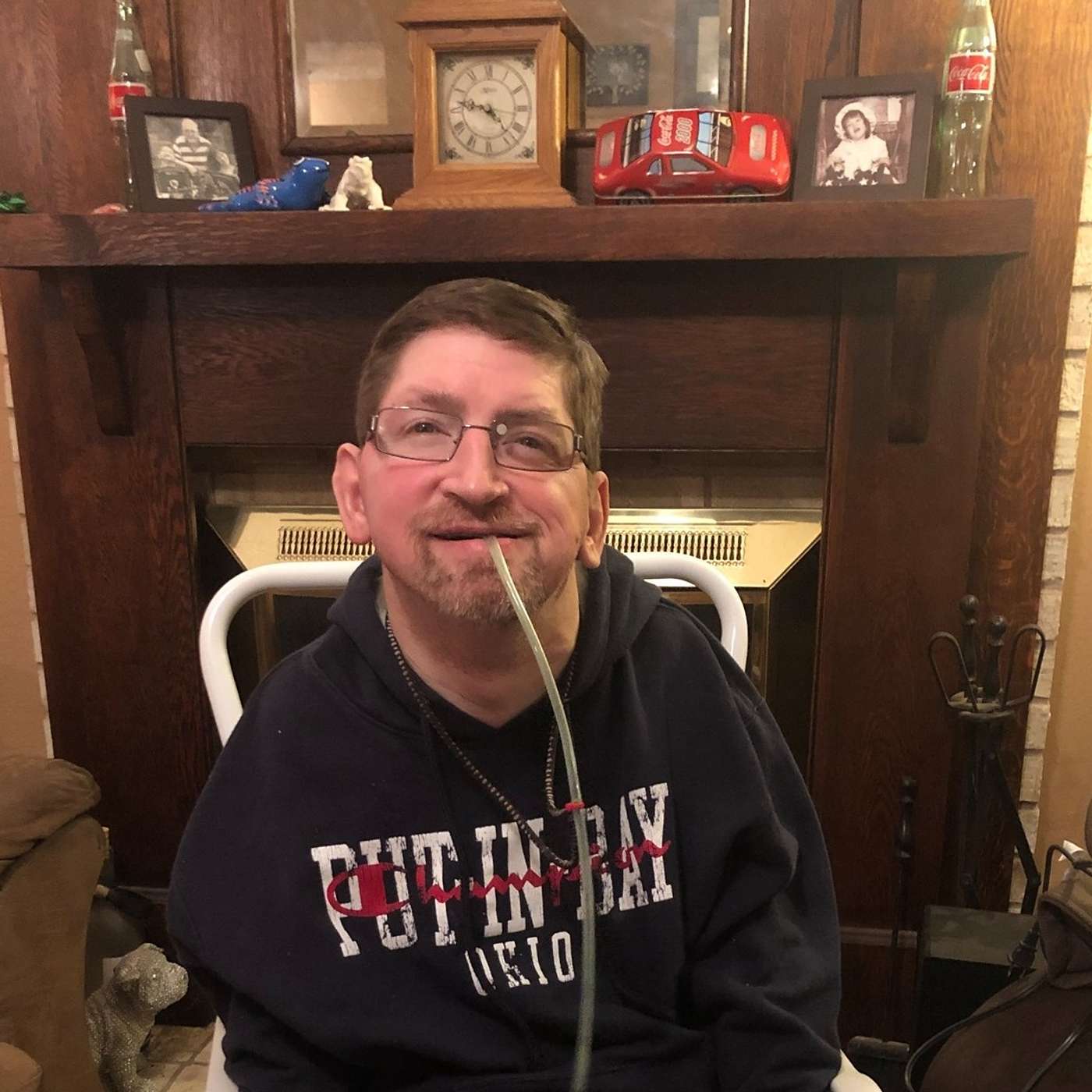
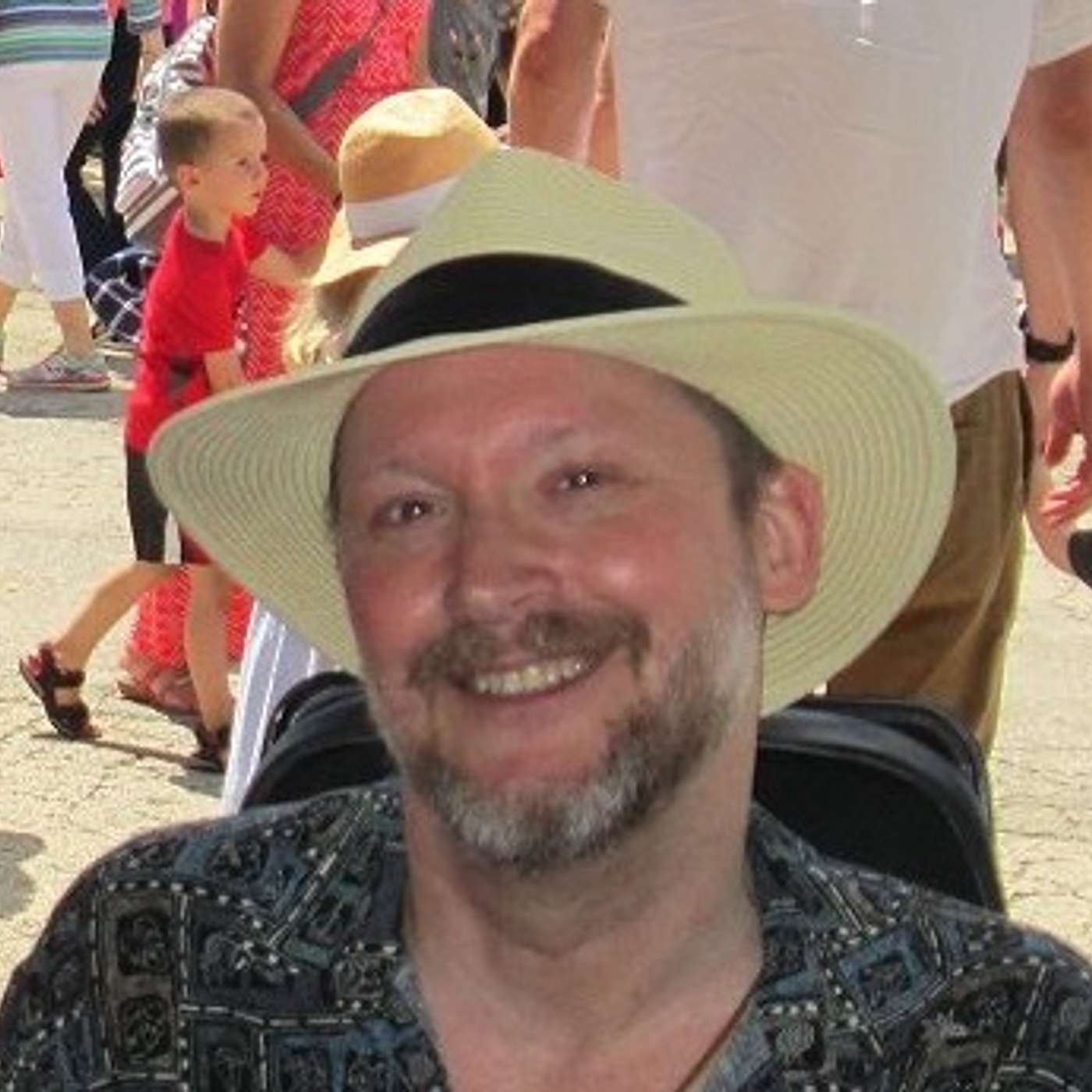


.jpg)







